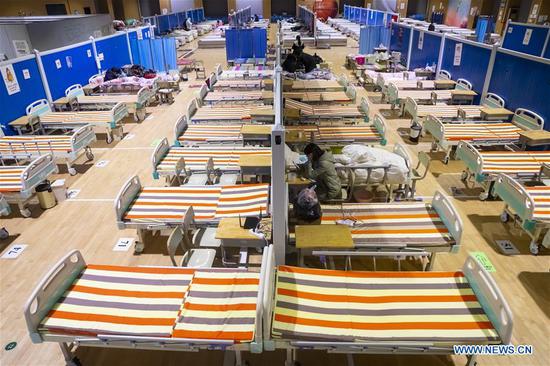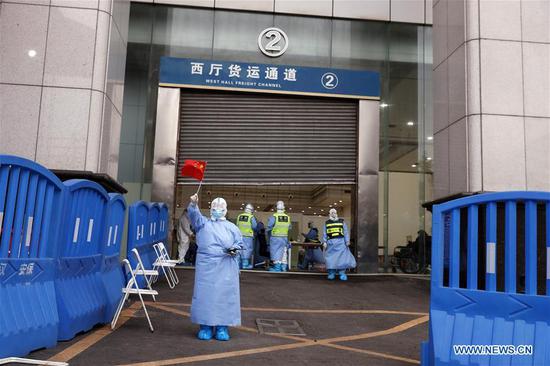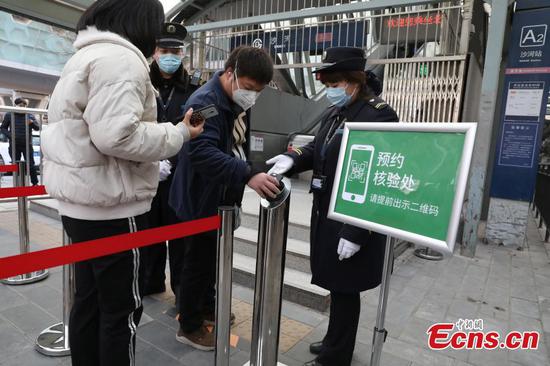Amid growing concern over COVID-19, global stock markets experienced the worst day since the 2008 financial crisis on Monday, mainly sparked by a sharp drop in the oil market.
The brutal sell-off on major stock markets on "Black Monday" reflects investors' concern about U.S. economic performance in the months ahead.
MARKETS PLUNGE
On Monday, all three major U.S. stock indexes tumbled more than 7 percent a few minutes after the markets opened. The massive sell-off triggered a key market circuit breaker and halted trading for 15 minutes.
The Dow Jones Industrial Average closed down more than 2,000 points, a drop of 7.79 percent, marking its worst day since 2008.
All the 11 primary S&P 500 sectors finished lower, with energy falling 20 percent, representing the worst-performing group.
Meanwhile, the Cboe Volatility Index, widely considered as the best fear gauge in the stock market, spiked 29.85 percent to 54.46 on Monday.
Outside the U.S., stock markets performed none the better. The Stoxx Europe 600 retreated by more than 7 percent, registering its worst single-day percentage drop since the 2008 financial crisis. In London, the benchmark FTSE 100 Index was down by 7.69 percent, marking its biggest one-day fall in years.
The stock markets plunge came amid a sharp drop in oil markets. On Monday, oil prices settled more than 24 percent lower, posting their worst day since 1991, as the discord between Saudi Arabia and Russia prompted investor fear of a price war.
Saudi Arabia announced massive cuts of its official selling prices for April over the weekend, and is reportedly ready to raise its oil production above the 10 million barrels per day level.
The move came after Saudi Arabia, Russia, and other oil-producing countries failed to strike a deal on output cuts last week.
"Today was an unprecedented move in the oil market," U.S. Treasury Secretary Steven Mnuchin said. "And that's obviously what had a major component today on the stock market."
Compounding the global market selloff on Monday was a sharp decline in safe-haven assets. The U.S. bond prices rose, and the yield on the benchmark 10-year U.S. Treasury slumped to an all-time low of 0.318 percent overnight before rebounding slightly. The 30-year Treasury yield hit a record low of 0.702 percent, breaching the 1 percent threshold for the first time in history.
Five-year UK yields traded below zero for the first time, and France, Germany, Spain and Japan were all trading in negative territory.
"Equity markets are showing extreme volatility, with outsized responses to new events amid uncertainty over the economic outlook," Krista Schwarz, an assistant professor of finance at the Wharton School of the University of Pennsylvania, told Xinhua.
VIRUS FEARS
The growing number of cases of COVID-19 around the world is dampening the outlook on global growth. A slump in oil prices coupled with the virus' spread amplified fears of a global recession, according to experts.
Last week, the Federal Reserve lowered the target range for the federal funds rate by 50 basis points to between 1 and 1.25 percent, its first emergency rate cut since the 2008 financial crisis, citing the COVID-19 outbreak as posing "evolving risks" to economic activity.
"Sharp drop in oil market reflects general global economic weakness," Steven Blitz, chief U.S. economist and managing director of TS Lombard, a research company, told Xinhua on Monday.
"Significant financial turmoil is already here, (due to) concerns about virus and impact on economic activity," Blitz added.
The past 10 trading sessions were among the most tumultuous in U.S. history, seeing the S&P 500 swing up or down more than 2.5 percent for four days straight. According to experts, markets are struggling to balance the competing forces of more extensive COVID-19 containment measures and monetary and fiscal stimulus for the economy.
"The near-term market focus is likely to remain on the virus's spread across Europe and the United States, and on stress in the financial markets," Mark Haefele, chief investment officer of global wealth management with the Swiss investment bank UBS, said in a note on Monday.
Investors cannot fully assess the situation of COVID-19 infections in the United States as the cases are underreported due in part to the lack of testing, and that credible solutions are absent, Phillip Colmar, managing partner on global strategy with MRB Partners, told Xinhua.
"We're gonna see a lot more volatility in the markets," he said.
Tim Duy, professor of the University of Oregon and a long-time Fed watcher, wrote in a blog post Monday: "Market participants clearly expect considerable economic pain in the months ahead."
Even if the reaction is excessive, "such panic can have very real consequences if credit markets begin to freeze," he said, and to prevent worsening problems, "the Fed may have to act again before the next (policy-making) meeting ... Realistically, the Fed should be discussing just taking rates to zero."
Blitz, of TS Lombard, said, "Fed has already cut rates 50 bps, and while they may cut again, the more significant work will be how they maneuver their balance sheet to add liquidity to ensure that credit is flowing."
As U.S. President Donald Trump on Friday signed an 8.3-billion-dollar emergency funding package to cope with the virus outbreak, the next few weeks are believed to be key in determining whether the virus outbreak in the world's largest economy could be contained at a relatively modest economic cost, or intensify, causing more drastic and prolonged disruptions to the economy.
Pointing to likely demand drops that affect retail and company sales as a result of virus containment measures, Ravi Anupindi, founding faculty director for the Center for Value Chain Innovation at the University of Michigan's Ross School of Business, noted that the wide geographic spread of the virus makes "the scale of supply chain impacts highly unpredictable."
Khairy Tourk, professor of economics at the Stuart School of Business at the Illinois Institute of Technology in Chicago, said less consumer spending would hurt the service sector that accounted for 60 percent of the increase in U.S. employment, and if the virus is to keep spreading, "the burden on low-wage frontline workers could be relatively high," adding to the large debts already facing American households.
"The question is whether the country has enough economic tools to deal with the crisis," he noted. "A prolonged economic crisis could pose a problem. This is because in terms of monetary policy, there is not much room for significant reduction in the interest rate."


















































